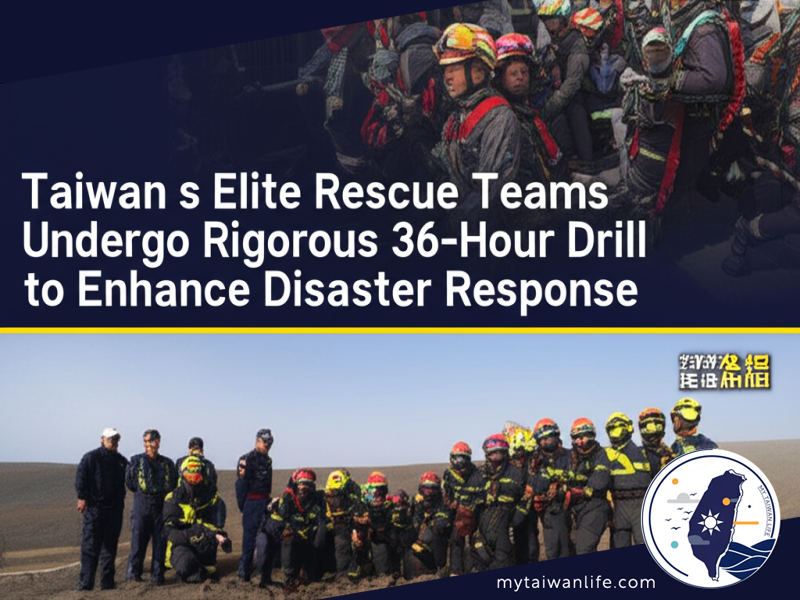Taiwan's Elite Rescue Teams Undergo Rigorous 36-Hour Drill to Enhance Disaster Response
Kaohsiung Special Search and Rescue Teams sharpen skills for complex disaster scenarios, aiming to be a leading force in Southern Taiwan.

To bolster disaster response capabilities, the Kaohsiung City Fire Bureau's Special Search and Rescue Teams conducted a comprehensive 36-hour simulated rescue exercise at the Nanzih Training Center from May 17th to 19th. The large-scale exercise involved 149 professionals, including firefighters, medical personnel, civil engineers, and veterinarians, along with four search and rescue dogs. They collaboratively simulated complex disaster scenarios, particularly those that might arise after an earthquake. The goal is for the Kaohsiung teams to become the most robust, dependable, and professional search and rescue unit in Southern Taiwan, dedicated to safeguarding the safety of the city's residents.
The demanding exercise adhered to the standards of the United Nations International Search and Rescue Advisory Group (INSARAG). It aimed to enhance cooperation among participating units, comprehensively evaluate existing equipment and techniques, train new recruits, and establish a comprehensive two-team rotation system. This preparation is crucial for the re-evaluation of the National Accreditation Program (NAP) heavy rescue team.
The training encompassed critical rescue operations, including supporting collapsed structures, breaking and cutting through concrete and metal, rope applications, emergency evacuation procedures, on-site medical treatment, search dog skills, and the use of technology in search efforts. Notably, the exercise incorporated technological advancements such as drones and through-wall cameras for wide-area searches, real-time 3D damage modeling, low-earth orbit satellite communication, and 360-degree real-time transmission of disaster information, enhancing the efficiency and safety of rescue operations.
To ensure the effectiveness of rescue operations, the Kaohsiung Special Search and Rescue Teams collaborated with external professional resources. They partnered with hospitals such as Kaohsiung Medical University Chung-Ho Memorial Hospital, Kaohsiung Veterans General Hospital, and E-Da Hospital. Doctors and nurses provided on-site emergency medical care and health support for rescue personnel. Veterinarians from Hongli Animal Hospital were responsible for monitoring and caring for the health of the search and rescue dogs to ensure they maintained their optimal search condition. Additionally, a team of civil engineers from the Kaohsiung City Civil Engineers Association assisted in building safety assessments and monitoring, providing crucial information for the first responders. Volunteer firefighters were responsible for setting up camp facilities, operating life-support systems, and providing logistical support, demonstrating an effective public-private partnership in rescue operations.
The Kaohsiung City Fire Bureau's Special Search and Rescue Teams have seen significant development in recent years, evolving into a national-level heavy rescue team. They are responsible for disaster rescue within the jurisdiction, providing support for major cross-city disasters, and participating in international humanitarian rescue rotations. Since passing the NAP medium-sized certification in 2023, they have quickly achieved the NAP heavy rescue certification within a year. During the 0403 Hualien earthquake, the Kaohsiung team demonstrated exceptional rescue capabilities, becoming the unit that provided the most manpower, arrived the earliest, and left the latest among all fire departments in Taiwan. They successfully rescued the most people, earning high praise from all sectors.
The Fire Bureau emphasizes that disasters are unpredictable. Therefore, continuous training, thorough preparation, close cooperation, and ongoing technological advancements are essential for rescue teams to respond rapidly and execute rescue missions effectively during times of crisis. The Kaohsiung Special Search and Rescue Teams are always prepared and will continue to conduct "36-hour continuous drill refreshers," institutionalizing and normalizing training to maintain and strengthen their rescue capabilities at the highest level.
Other Versions
Los equipos de rescate de élite de Taiwán se someten a un riguroso simulacro de 36 horas para mejorar su respuesta en caso de catástrofe
Les équipes de sauvetage d'élite de Taïwan se livrent à un exercice rigoureux de 36 heures pour améliorer la réponse aux catastrophes
Tim Penyelamat Elit Taiwan Menjalani Latihan Ketat Selama 36 Jam untuk Meningkatkan Tanggap Bencana
Le squadre di soccorso d'élite di Taiwan si sottopongono a una rigorosa esercitazione di 36 ore per migliorare la risposta ai disastri.
台湾の精鋭救助隊、災害対応強化のため36時間の訓練を実施
대만의 엘리트 구조팀, 재난 대응력 강화를 위해 36시간에 걸친 엄격한 훈련 실시
Ang Elite Rescue Teams ng Taiwan Sumasailalim sa Mahigpit na 36-Oras na Pagsasanay upang Mapahusay ang Pagtugon sa Sakuna
Элитные спасательные команды Тайваня проходят жесткие 36-часовые учения для повышения эффективности реагирования на стихийные бедствия
ทีมกู้ภัยชั้นยอดของไต้หวันเข้ารับการฝึกซ้อมเข้มข้น 36 ชั่วโมงเพื่อเพิ่มประสิทธิภาพในการรับมือภัยพิบัติ
Đội Cứu Hộ Tinh Anh Đài Loan Trải Qua Bài Huấn Luyện 36 Giờ Nghiêm Ngặt Để Tăng Cường Ứng Phó Thảm Họa

